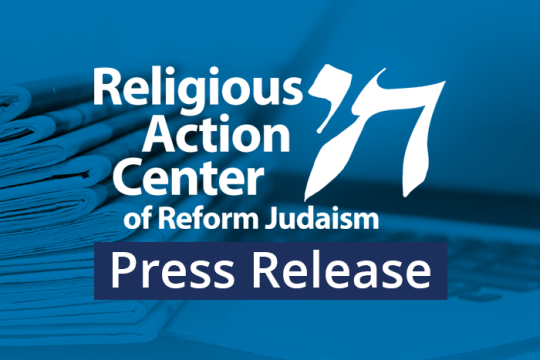April 12, 2021- As organizations that represent religious denominations or are formally affiliated with religious communities, we express our deep concern about the recent proliferation in a number of states of legislation seeking to exempt houses of worship and religious gatherings from the reach of regulations and emergency orders related to public health issues and emergencies such as COVID-19. We appreciate the desire to protect our right to worship and gather for religious activities. Too often, however, these bills are overly broad and could result in policies that threaten public health and safety.
Religious freedom is a fundamental American value, and the freedom to worship in accordance with one’s spiritual practices and traditions is a right of the highest order. At the same time, religious freedom does not demand tying the hands of public officials who are trying to safeguard public health as they respond to unforeseen events like pandemics, natural disasters and other emergencies. Indeed, all of our denominations have found creative ways to provide opportunities for worship during the pandemic, recognizing the spiritual sustenance and sense of community that religious practices provide.
Recent Supreme Court decisions make clear that states can place some limits on in-person religious gatherings. In Roman Catholic Diocese of Brooklyn v. Cuomo, decided in November 2020, the Supreme Court recognized that states can impose limitations on houses of worship and religious gatherings but cannot treat religious activities worse than comparable secular activities. Unfortunately, bills across the states are instead granting houses of worship blanket exemptions from emergency orders in ways that misread the Supreme Court rulings and threaten to harm public health. We oppose those efforts.
We represent a diverse array of faith traditions but share a deeply held commitment to protecting life and the most vulnerable among us, especially in the face of a global pandemic or other emergencies. To save lives, we must continue to listen to medical and public health professionals and acknowledge that social distancing measures—both in secular and religious settings—have proven critical in containing viral outbreaks. Regulating gatherings, even at houses of worship, may continue to be one of the best ways to protect public health.
Times of public crisis demand that all community leaders—religious, secular, and governmental—work together to find solutions. By giving religious gatherings a pre-emptive exemption from future emergency orders, we fear that these bills will unintentionally paint religious communities as part of the problem, not the solution, and thereby undercut our ability to partner with community leaders to defeat the crisis.
This pandemic has been difficult for us all. We all wish to return to in-person worship services, but now is the time for religious communities to lead by example, taking proactive steps to 2 keep ourselves and the broader community safe. These bills, which claim to protect houses of worship, do not make religious gatherings safer—to be sure, the pandemic acknowledges no religious exemption.
We urge you to oppose these proposals as you respond to the pandemic.
ADL (Anti-Defamation League)
Alliance of Baptists
American Baptist Home Mission Societies
Baptist Joint Committee for Religious Liberty (BJC)
Baptist Women In Ministry
Bend the Arc: Jewish Action
Central Conference of American Rabbis
Cooperative Baptist Fellowship
Disciples Center for Public Witness
Disciples Justice Action Network
Equal Partners in Faith
Evangelical Lutheran Church in America
Fellowship Southwest
Interfaith Alliance
KARAMAH: Muslim Women Lawyers for Human Rights
Men of Reform Judaism
Methodist Federation for Social Action
Muslim Advocates
National Council of Churches
National Council of Jewish Women
Presbyterian Church (USA) Office of Public Witness
Reconstructionist Rabbinical Association
Union for Reform Judaism
Unitarian Universalist Association
Unitarian Universalists for Social Justice
United Church of Christ, Justice and Local Church Ministries
Women of Reform Judaism


